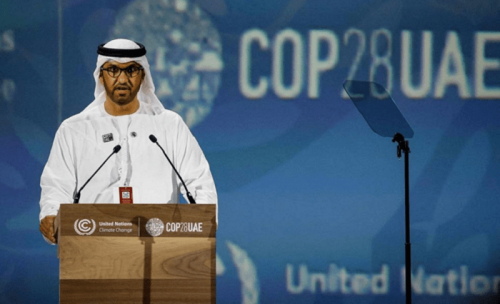THE ongoing COP28 summit in the UAE is a crucial event in the global climate discourse, with significant implications for countries like Pakistan. The summit has seen a complex mix of diplomatic manoeuvring, fervent appeals for climate justice, and sharply divergent views on the future role of fossil fuels.
Caretaker Prime Minister Anwaar-ul-Haq Kakar’s address yesterday emphasised Pakistan’s urgent need for “sufficient, additional, and predictable grant-based climate finance” from developed nations. Urging the immediate execution of the $100bn goal for climate finance, Mr Kakar said this should not exacerbate the debt burden of developing states. He stressed the need for a robust framework for global adaptation goals, with clear targets, indicators, and progress monitoring. He called for at least half of climate finance to be allocated to adaptation, reflecting the growing urgency for balanced climate action.
Mr Kakar also highlighted Pakistan’s proactive climate initiatives, and mentioned that at COP26 Pakistan committed to a 60pc reduction in projected emissions by 2030. He introduced the National Adaptation Plan and the Living Indus Initiative, showcasing Pakistan’s commitment to integrating climate considerations into national development plans.
The conference has been marked by major developments, notably the establishment of the Loss and Damage Fund to aid poorer countries in coping with climate disasters. Despite the fund’s initiation with $700m, it falls short of the $100bn sought by developing nations, highlighting the challenge in securing adequate financial support for those most affected by climate change.
COP28’s discussions on fossil fuels have been particularly contentious. UN Secretary General António Guterres’ call for a future without fossil fuels starkly contrasts with COP28 President Sultan Ahmed al-Jaber’s advocacy for their continued use. This discord underscores the complexities and political intricacies of the climate crisis, particularly in oil-producing regions like the UAE.
Moreover, geopolitical tensions, notably surrounding the situation in Gaza, played into the summit’s climate-focused agenda. Given the scale of the devastation there, several world leaders were compelled to diverge from the norm of avoiding politics at UN climate summits, using their platforms to criticise Israel’s actions in Gaza. This aspect adds another layer of complexity to the negotiations.
The decisions and discussions at COP28 will undoubtedly shape the global response to climate change and the fate of vulnerable countries like Pakistan. The summit must result in actionable commitments, not just in financial terms but also in technological and capacity-building support, to ensure an equitable path forward in the global climate effort.
The climate crisis transcends national borders and political agendas, demanding a unified, decisive response. As nations convene and deliberate, the world watches, hoping for outcomes that will chart a sustainable course for the planet’s future. For Pakistan, a nation at the front-line, the stakes could not be higher.
Published in Dawn, December 3rd, 2023















































Dear visitor, the comments section is undergoing an overhaul and will return soon.